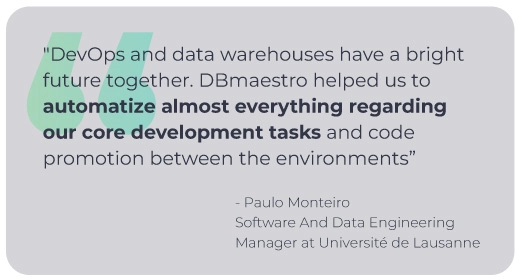Integration of DevOps practices into database operations is becoming increasingly essential. This approach not only enhances operational efficiency but also fosters collaboration and improves data security. This blog post explores the key benefits of adopting DevOps in database management, providing valuable insights into how these practices can transform your operations.
Introduction
DevOps has fundamentally changed the landscape of software development and IT operations, and its application to database operations is no different. By fostering a culture of collaboration and continuous improvement, DevOps practices can significantly enhance database management processes. This post delves into the key benefits of implementing DevOps in database operations, offering a roadmap for organizations looking to optimize their workflows.
What You Will Learn
- The significance of integrating DevOps into database management
- How DevOps fosters collaboration between teams
- The role of automation in increasing operational efficiency
- Strategies for managing legacy systems within a DevOps framework
- Best practices for continuous monitoring and performance optimization
Understanding DevOps in Database Operations
DevOps in database operations involves applying DevOps principles—such as continuous integration, continuous delivery, and automation—to database management. This integration is crucial for aligning database operations with the agile and fast-paced nature of modern software development. By adopting DevOps practices, organizations can ensure that their database operations are more responsive, efficient, and secure.
The significance of DevOps in database operations cannot be overstated. It allows for faster deployment of database changes, improved collaboration between teams, and a more streamlined approach to managing database environments. This is particularly important in today’s environment, where businesses must adapt quickly to changing market demands and technological advancements.
For more details, refer to the DBmaestro Database DevOps guide.
 Enhanced Collaboration Between Development and Operations Teams
Enhanced Collaboration Between Development and Operations Teams
One of the core tenets of DevOps is fostering collaboration between development and operations teams. In the context of database operations, this collaboration ensures that database changes are seamlessly integrated into the development process, reducing bottlenecks and enhancing overall productivity. By breaking down silos, teams can work together more effectively, leading to faster delivery times and improved quality of database updates.
Enhanced collaboration results in better communication and understanding of each team’s responsibilities. This shared knowledge helps to align goals and objectives, ensuring that both development and operations teams are working towards the same outcomes. As a result, organizations can achieve higher levels of efficiency and innovation.
Increased Efficiency through Automation
Automation is a cornerstone of DevOps practices, and its application in database operations can lead to significant efficiency gains. By automating routine tasks such as database provisioning, testing, and deployment, organizations can reduce the risk of human error and free up valuable resources for more strategic initiatives. This increased efficiency not only accelerates development cycles but also improves the reliability and consistency of database operations.
Benefits of Automation
- Reduced Manual Errors: Automation minimizes the risk of human error, leading to more accurate and reliable database operations.
- Faster Deployment: Automated processes enable quicker deployment of database changes, allowing organizations to respond rapidly to market demands.
- Resource Optimization: By automating routine tasks, teams can focus on higher-value activities, such as strategic planning and innovation.
Improved Data Security and Compliance
Data security is a critical concern for any organization, and DevOps practices can enhance security measures within database operations. By incorporating security checks into the development pipeline, organizations can identify and address vulnerabilities early in the process. This proactive approach to security ensures that databases are protected against potential threats, safeguarding sensitive data and maintaining compliance with industry regulations.
The integration of security measures into the DevOps process is often referred to as DevSecOps. This approach emphasizes the importance of security at every stage of the development lifecycle, ensuring that security considerations are not an afterthought but an integral part of the process. By adopting DevSecOps practices, organizations can achieve a higher level of security and compliance, reducing the risk of data breaches and regulatory penalties.
For more insights, see the importance of DevSecOps.
 Overcoming Challenges in Implementing Database DevOps
Overcoming Challenges in Implementing Database DevOps
While the benefits of DevOps in database operations are clear, organizations may face challenges during implementation. These challenges can include resistance to change, lack of expertise, and the complexity of integrating DevOps with existing systems. To overcome these obstacles, organizations should invest in training, foster a culture of collaboration, and leverage tools and technologies that support DevOps practices.
Managing Legacy Systems
Integrating DevOps practices with legacy systems can be challenging but is essential for modernizing database operations. Legacy systems often lack the flexibility and scalability required for a DevOps approach. By adopting a phased approach, organizations can gradually introduce DevOps principles, ensuring that legacy systems are updated and maintained without disrupting existing workflows. This transition requires careful planning and collaboration but can ultimately lead to more agile and efficient database operations.
Continuous Monitoring and Performance Optimization
Continuous monitoring is vital in database DevOps to ensure optimal performance. By implementing monitoring tools, organizations can track performance metrics, identify bottlenecks, and make data-driven decisions to optimize database operations. Continuous monitoring allows teams to proactively address issues before they escalate, ensuring that databases remain performant and reliable.
Key Takeaways
- DevOps enhances database operations through improved collaboration, efficiency, and security.
- Automation plays a crucial role in streamlining processes and reducing errors.
- Managing legacy systems requires careful planning and collaboration.
- Continuous monitoring is essential for performance optimization.
How DBmaestro Can Help
DBmaestro offers a comprehensive platform that supports the implementation of DevOps in database operations. With features such as database release automation, security checks, continuous monitoring, and DORA™-driven DevOps performance dashboard DBmaestro helps organizations achieve their DevOps goals efficiently. The platform provides tools that facilitate collaboration between development and operations teams, ensuring that database management is aligned with overall business objectives.
By leveraging DBmaestro’s capabilities, organizations can enhance their database operations, reduce risks, and improve overall performance.






